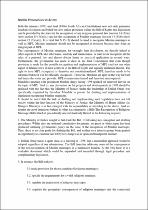| dc.contributor.author | Mahomed, Ashraf | |
| dc.contributor.author | Moosa, Najma | |
| dc.date.accessioned | 2022-09-23T10:04:57Z | |
| dc.date.available | 2022-09-23T10:04:57Z | |
| dc.date.issued | 1999 | |
| dc.identifier.citation | Mahomed, A. and Moosa, N. (1999) “Muslim Personal Law (MPL) in review” Annual Review of Islam in South Africa (ARISA)(Centre for Contemporary Islam, UCT) 2:5-7 | en_US |
| dc.identifier.isbn | ISBN:9781485127161 | |
| dc.identifier.uri | http://hdl.handle.net/10566/7958 | |
| dc.description.abstract | Both the interim (1993) and final (1996) South African Constitutions now not only guarantee freedom of religion and belief but also makes provision within the Bill of Rights that legislation can be provided by the state for the recognition of any religious personal law (section 14 (3)(a)) (now section 15 (3)(a)(ii)) and for the recognition of Muslim marriages (section 14 (3)(b)) (now section 15 (3)(a)(i)). It is vital that S 15 (3) should be used to recognize Muslim marriages as well as MPL. Muslim marriages should not be recognized in isolation because they form an integral part of MPL The consequences of Muslim marriages, for example their dissolution, are directly linked to other aspects of MPL like inheritance, custody and maintenance. A state never recognizes all the rules of a personal law and almost always limits its practical application in several ways. Furthermore, the government has made it clear in the final Constitution that even though provision is made for the possible recognition and implementation of MPL (and not any other aspect of Islamic law), it must conform to the Bill of Rights and equality enshrined therein. The right to have MPL recognized is therefore not constitutionalized. MPL therefore needs to be reformed before it will be officially recognised. However, Muslims are split on the way forward and hence the status quo prevails: MPL remains unreformed and therefore unrecognised. Mandela's meeting with prominent Muslim clergy during 1998 sparked off renewed fervour on the topic of MPL. And so, any discussion on the progress and developments in 1998 should be prefaced with the fact that the Ministry of Justice, under the leadership of Dullah Omar, was specifically requested by President Mandela to pursue the drafting and implementation of legislation recognising Muslim marriages. | en_US |
| dc.language.iso | en | en_US |
| dc.publisher | Centre for Contemporary Islam UCT | en_US |
| dc.relation.ispartofseries | Annual Review of Islam in South Africa;2 | |
| dc.subject | Muslim Personal Law | en_US |
| dc.subject | The Constitution of South Africa | en_US |
| dc.subject | Bill of Rights | en_US |
| dc.subject | Recognition of Muslim marriages | en_US |
| dc.subject | Muslim Marriage | en_US |
| dc.title | Muslim Personal Law (MPL) in review” | en_US |
| dc.type | Article | en_US |

